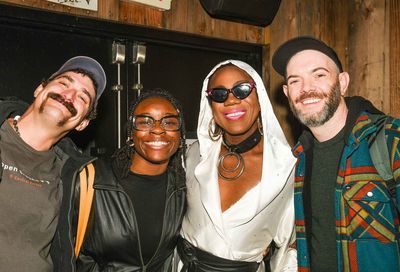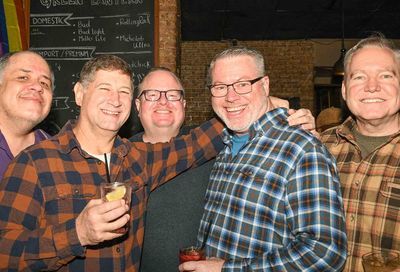Strip Search
Craig Seymour set out to find himself by dancing in D.C.'s famed male strip clubs
Craig Seymour is exposed, past and present. As a University of Maryland graduate student, the metro Washington native entered the world of Southeast D.C.’s male-stripper venues. The premise was academic, at first interviewing patrons and strippers for the sake of his thesis. Moving on to doctoral work in American studies, he took things a step further, becoming a stripper himself.
Today, Seymour stands further exposed, this time in print, with the release of All I Could Bare: My Life in the Strip Clubs of Gay Washington, D.C. It’s a somewhat ballsy move for an academic, soon to relocate from his post at University of Massachusetts Dartmouth to a spot teaching journalism at Northern Illinois University. But if such a memoir — replete with cum shots, hand jobs and crotch biting — caused him any fear, it was all the more reason to do it. Conquering fear, after all, went hand in hand with entertaining his clients in nothing but socks and a smile.
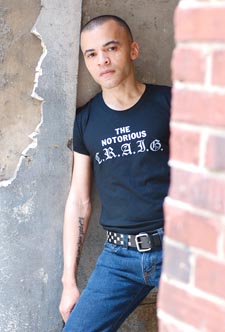
Craig Seymour
”It really goes back to the message of the book, where I write about continually taking risks,” says Seymour, who has spent the last few years making the half-hour commute to UMass from Providence, R.I., in part because of what he says is a fantastic culture of male-strip bars in that city. ”As much as I like Providence, this was a great opportunity and I owed it to myself to take that other risk, to see what more might be out there for me.
”That’s why it’s really important. I’m leaving all my friends. I’m leaving this great place. But I felt it was something I had to do, or else I wasn’t even living up to the message of my own book.”
That message, learned in large part in Southeast, has not only helped Seymour in academia, but as a music journalist at Vibe, Entertainment Weekly and elsewhere, finding ways to get Mariah Carey, Luther Vandross and Janet Jackson to reveal themselves. Seymour also likely gleaned some of the message from his teenaged friendship with another local, Matt Drudge, remembered by Seymour for his laser-like focus.
Seymour’s sense of fearlessness does not, however, come with much bravado. Instead, this slight 39-year-old with a member nicknamed ”The Weapon,” bares a demeanor that is charming and polite. Consider that during this interview, conducted June 19 when he was in D.C. for a reading, his allergies were acting up horribly. Seymour may have spent years heavily lubricating his erect penis to prevent chaffing during an evening of yanks and wanks from the crowd, but his sense of decorum forces him to leave the room each time he needs to blow his nose.
METRO WEEKLY: I notice you have a few tattoos. The cross is obvious. What’s that other one?
CRAIG SEYMOUR: Oh, it’s just my name. And one more [lifting his left arm to reveal a third tattoo]: That’s a symbol from Ghana. It means, ”I’m not afraid of you.”
MW: Is that message directed at you, or others?
SEYMOUR: It’s really for me, in terms of facing my own personal fears — that I’m not going to let the insecure part of myself, the fearful part of myself, stop me. That I’m going to keep forging forward.
I actually got this [tattoo] when finally I decided to write this book. That was at the early stage, to help me. I need to be hit over the head with messages. My computer is full of little slogans. I have to write things on my body to remind myself of why I’m making certain decisions, to give me the courage to move forward.
The cross I got a couple months ago, when I decided to take this new job as a journalism professor at Northern Illinois University. It’s by a Providence artist. I loved his crosses. I wanted to get one before leaving Providence, but also just in terms of the faith it takes to go forward with a new job where I don’t know anybody, to have a symbol of faith on me.
MW: So it’s not a display of Christianity?
SEYMOUR: I’m not an organized religion person. I think I take from all sorts of spiritual traditions. I’ll take whatever advice I can get from any tradition about how to better live my life, how to better treat people, and everything like that. It just so happens that there are a lot of things in the Bible, things that Jesus said that I take a lot of inspiration from.
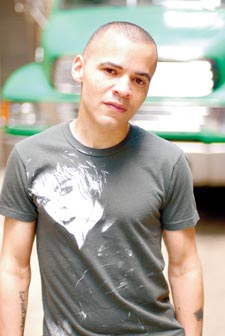
MW: Were you raised with religion?
SEYMOUR: Nothing strong or overt. My parents never forced me to go to church or anything. My grandfather was a deacon in the church. I’m very comfortable with the Christian tradition in terms of gospel songs and all that kind of stuff, that imagery. But personally I draw from a lot of different traditions. I have a huge Buddha on my desk.
MW: I’m only pressing here since your book and background have so much to do with sex, and a person’s religious background can weigh heavily on sexuality.
SEYMOUR: I have no baggage there. One of the most profound things I remember — a religious teaching growing up — is people would tell me that Jesus would hang out with the thieves and the prostitutes. That always meant to me I should never judge people who live outside of the norm, but also that there was some kind of knowledge to be gained in those spaces that are kind of off the beaten track.
If anything, there’s a reverse religious teaching. Those types of things I was taught as a child might actually have drawn me to the strip clubs, because I never thought there was anything wrong with it. For me, it was always about trying to understand what was going on.
MW: The ”eternal damnation” bit was lost on you?
SEYMOUR: It really was. I don’t really have a lot of guilt impulses. I pretty much decide what I’m going to do and go forward. I think that’s really a blessing, because I have friends who just struggle with all sorts of guilt about this and that. I’m not even talking on a big level. I’m talking about just whether or not they —
MW: Blow off an invitation?
SEYMOUR: Yeah, exactly. And I really don’t have that, thank God.
MW: Has Matt Drudge gotten in touch to congratulate you on the book?
SEYMOUR: No. When Vanity Fair did this big profile on him I e-mailed him. I think we exchanged a couple of e-mails.
A couple of weeks ago, I e-mailed just to let him know he’s in this book. ”If you want me to send you a copy, I will.” I didn’t hear back from him. I didn’t really expect to. He was just a hanging buddy when we were 18 or 19. We just talked every day on the phone — just talking about entertainment news, entertainment gossip, stuff like that. Nobody took him seriously. He was almost too intense for everyone else but me. That’s why I was one of his few friends. He always had this vision of himself as somebody who should be taken seriously, and he felt like he should be a news voice, a journalism voice, even though at that time — this was in the late ’80s — it was just not conceivable how somebody with a kind of limited education, no real writing skills or anything, how he could possibly become that, become a force to be reckoned with.
To me, it’s just an amazing example of someone who had a clear vision of who he was and what he wanted to be in the world and just found a way to make that happen.
MW: If not Matt, then, who has contacted you? Any fellow dancers? Patrons?
SEYMOUR: No one yet. I think it’s just too new. I’ve already gotten a lot of mail just this week from people — not from the D.C. scene — but from people who have stripped in other places. It’s great. I love hearing from people after they read the book.
When writing this book, I really wasn’t sure exactly what form it was going to take. I knew it was going to be my life’s story. It turned out to be much more of a memoir. I made a decision to make it as if we just met in a bar and you say, ”Oh, you used to strip?” ”Yeah, let me tell you my story.” To make it very conversational.
As a dancer, you don’t really know that much. You don’t talk to the owners much. I was just a dancer. I just went in and stripped. My primary interactions were with the customers. That’s the story that’s there.
MW: What reaction have you gotten from your family? I got the impression from the book that they knew you were stripping.
SEYMOUR: No, they never knew. I told them for the first time last Thanksgiving, just that I’d been a stripper at all and that that was what the book was about. They totally didn’t know.
What they did know was that I studied the strip scene as a student. They didn’t know that I’d actually danced myself. So there was a little bit of shock, but I think my family is used to me doing crazy things. It didn’t seem like it was completely unexpected.
I told them I was writing a memoir and it involved my sex life, but I hadn’t told them that I was a stripper and that the whole book was about me stripping. Then, at Thanksgiving, I told them about the stripping. Of course, their image of stripping had more to do with Chippendales, or something like that. [Laughs.] So in March when I got a galley version, I gave both my mom and dad copies of the book and let them read it.
MW: Did you give them any instruction, warning?
SEYMOUR: No, I deliberately didn’t, because I’m not ashamed of my story. I really feel that it’s important for me to represent it matter of factly, at face value. I feel like if I do things like, ”Oh you might be a little shocked by this, beware,” that’s almost like I’m implicitly stating that there’s something wrong with it, or that there’s something bad.
I just kind of gave it to them and then let them have whatever reaction they were going to have. My dad was almost retroactively mad at some of the stuff I did in the book. He told me he would be yelling at the book. My mom was much cooler about it, but she was glad that I didn’t tell her at the time, because she would’ve been a nervous wreck.
MW: Anything along the lines of, ”We never knew you felt that way?”
SEYMOUR: In the Janet Jackson chapter about how nervous I was because it was my ”big break” and I didn’t know whether or not I could pull it off, my mom said something like she didn’t know how insecure I felt at the time.
I’m the kind of person who likes big challenges. I like to be out there, to do big things, and because of that there’s probably a certain degree of ego that comes with that, a certain degree of toughness. I have a tough exterior to put myself out there constantly and do these kinds of things. Sometimes people don’t realize there’s always a scared person behind all that.
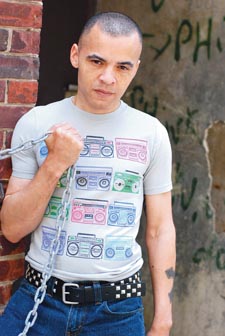
MW: The insecurity you write about, particularly in regard to the first time you stripped, how does that compare to exposing yourself in print?
SEYMOUR: It’s a lot different. If you’re standing up there naked, what’s the worst somebody can say? They think you’re fat, or they think you’re ugly. You can get over that.
Here, somebody can say, ”I think you’re dumb. I think you’re stupid, I think you can’t write, I think you’re delusional.”
But I try not to focus on the byproducts of decisions I make. I try to just be very clear about my intention in going into what I’m doing, and then, come what may.
I thought that I had a story that was important to tell, both in terms of my personal story and in terms of the backdrop being this very important cultural scene. I thought that was something important and that’s why I was willing to do it and that’s why I’m willing to take the consequences.
The other thing about it is I just refused to be scared of the consequences, personally or professionally, because I feel like I’m writing in a time that’s so supportive of gay culture. Sex and the City was just the No. 1 movie in the country. There’s kind of an increased dialogue about sexuality across the whole pop-culture landscape. I think about people writing about gay issues back in the ’50s, people like James Baldwin, or even somebody like Armistead Maupin in the ’70s, writing gay stuff without this sort of supportive climate. I feel that because of what all these people did, and the sacrifices they made, if I complain now about writing something like this, I would just be a complete asshole.
MW: Is your fearlessness something innate or something learned?
SEYMOUR: I don’t think I was this way before I stripped. I became this way afterward, because I think I was very scared of taking risks all of my life before I stripped. I knew I was really interested in pop culture. I knew I really wanted to be a writer. But instead of just trying to do a writing career, I entered grad school — the safe thing to do. I made all of these ”safe” decisions.
When I finally decided to strip, which was really out there, my life started to turn around in ways that I actually liked. My life started to improve based upon making that big change.
So that’s what I believe in now. I’m not saying take any risk — I mean taking those risks that seem really scary, but there might be a bigger reward on the other end of it. Or taking those risks that can seem really scary, but they keep haunting you so that it’s almost like you have to do it to make peace with it. Which is what stripping was.
When I started stripping, I had no way to know that it was going to ultimately end up being a book or that stripping would ultimately end up helping me interview Mariah Carey. [Laughs.] But it was such an obsession, so all-consuming, I think I needed to do it just to exercise that and get it out of my system.
I’ve had people come to me and share how my story has helped them conquer all sorts of little fears. There are a million ways that fear really just constrains us. It’s about constantly interrogating what little fears we might have that may be holding us back, that we don’t even know about, at all sorts of levels.
MW: Was it difficult to find a publisher for a graphic memoir of the male stripping scene?
SEYMOUR: That’s a question for my agent! I have a really great, high-powered agent. The fact that she took it on was just so amazing to me. It instantly gave the project a lot of credibility.
I don’t know if people told her, ”What’s this pornographic bullshit?” All I know is that she sold it to Atria. They do a lot of current-events stuff, but they also do a lot of sexy stuff. They do Zane, the black erotica writer who’s really popular.
I think it probably was [difficult] and she’s just protecting me from that. People are scared away because my language is just so out there. I had to do that. I had to be true to the person I was, the way I think inside my head, which is often full of four-letter words. It’s also what the culture is like.
One thing that is surprising is that, because the publishing industry is still in this mindset that explicitly gay books don’t sell — obviously gay men buy a lot of books, but the books that come out [targeting them] from mainstream presses don’t sell that well — I did have to make a big pitch about how the book would have appeal beyond gay men. In fact, gay men were not even the primary audience for the book. When you write a proposal, you have to talk about who will be the audience. I couldn’t write [gay men], because everybody would go, ”Gay books don’t sell.” Sadly, that’s the adage in the publishing industry.
MW: So who did you propose as your primary audience?
SEYMOUR: Women. ”Chick lit” readers. I said I thought the book would really appeal to a woman who would take a copy of Sex and the City with her as she vacations on Brokeback Mountain.
Statistics show that women are the primary audience for, like, Will & Grace. Even for Queer As Folk on Showtime. Women were the biggest audience for Brokeback Mountain. There’s a precedent there.
Interestingly enough, a lot of the issues I had were very specific to my experience as a gay man. But I think a lot of things about body image, wondering whether or not you’re attractive and all that, I think a lot of women can relate to that.
A lot of straight women [friends] have read the book and almost all of them call me up and say, ”Oh my gosh, the book is so hot. It’s just so sexy!” When I wrote the book, I wasn’t really writing it with the intent to turn people on. I was just showing what the scene was like. I don’t see the experience as that sexy, but a lot of straight women do. It’s just because there’s a lot of dick in the book, I guess. [Laughs.] There’s a lot of talk about hard cocks, and cocks getting hard, and people tugging on cocks. That’s the only thing that makes sense for me, why so many straight women think it’s really a horny book.
A lot of my gay friends read it and they think the sex scenes are kind of funny. But I’ve had women tell me that they had to stop reading, have sex with their husbands, then go back to reading.
MW: You’ve talked about hitting the stipper bars in other cities. But now that D.C. doesn’t have any, what will you do after your reading tonight?
SEYMOUR: [My former partner] Seth is coming in, and his sister. We’ll probably get drunk at the hotel. The last time I was here, I think I went to [Omega] and they had go-go boys. It’s not like I can’t have fun without strippers! I almost never go to the strip club in Providence anymore. If I’m in a new town, in a town visiting, I’ll definitely go to the strip clubs. It’s not like I’m obsessed, but I do like them. It’s an environment I feel comfortable in. It’s not like I have to go every night. I don’t need to go to the bank a get $100 in ones. It’s just a place I like to hang out. And, of course, look at naked dudes.
MW: Are you a better tipper than most?
SEYMOUR: It depends on what you mean as far as ”better.” Better in terms of having a lot of money, no. I’m not tipping $20s and $100s. But I’m a consistent tipper. I always tip. I tip all across the board.
MW: Are you as ”sex positive” these days as one might imagine, or a bit more conservative than the book implies?
SEYMOUR: Sexuality is an interesting area to explore who we are. But it depends on what you mean by that. I’m very invested in being very free in terms of thinking about sexuality. I don’t have a lot of hang-ups about my body and about my sexuality at this point in my life. I did a completely naked reading from the book a couple of weeks ago in New York. Other authors did it, too. I’m cool to do that sort of thing. At the same time, I almost never hook up. I don’t have a lot of one-night stands. A lot of my friends almost think I’m prudish at this point in my life because I don’t do stuff like that. I’m not making any judgment on that. I’m probably not interested because I’ve been with so many guys. [Laughs.] I’m not interested in random hookups. I’m more interested in connecting with somebody, not necessarily forever, but at least more than one night.
MW: To run into you at a stripper bar would not be uncommon, but a sex party…?
SEYMOUR: You might run into me at a sex party, but you probably won’t find me hooking up at the sex party. I might just be there for the environment, just chillin’. I might make out with somebody. Or, if I’m particularly horny, maybe you will find me at a sex party doing something. But it’s not very often. I don’t think I’ve had sex with five people this year. But I love sex parties. I love being around the environment of sex. I love all of that kind of stuff.
As far as bringing people home or going to people’s houses, it’s not something I’m that interested in now. I really love the idea of connecting with another person and using sex to kind of deepen the feelings I have with somebody, to deepen intimacy. I’ve kind of done the ”sex as sport, sex as adventure” thing. It’s not as interesting to me. Which is not to say I don’t sometimes get horny and just want to get off. But those times get less and less.
MW: Back to the book, specifically, what sort of reception are you hoping for?
SEYMOUR: I hope my book provides food for thought and that people can think of serious issues based on reading my book, but I don’t have any desire for people to analyze the seriousness of every word.
I want people to enjoy my book the way they enjoy a great Madonna album. When people say my book’s a great beach read, I love that! I love my book sitting next to a beach ball.
All I Could Bare: My Life in the Strip Clubs of Gay Washington, D.C., (Atria, $23) is available at area booksellers, including Lambda Rising Bookstore on Connecticut Avenue NW, and online at www.lambdarising.com and www.amazon.com
Advertisement
|
Support Metro Weekly’s Journalism
These are challenging times for news organizations. And yet it’s crucial we stay active and provide vital resources and information to both our local readers and the world. So won’t you please take a moment and consider supporting Metro Weekly with a membership? For as little as $5 a month, you can help ensure Metro Weekly magazine and MetroWeekly.com remain free, viable resources as we provide the best, most diverse, culturally-resonant LGBTQ coverage in both the D.C. region and around the world. Memberships come with exclusive perks and discounts, your own personal digital delivery of each week’s magazine (and an archive), access to our Member's Lounge when it launches this fall, and exclusive members-only items like Metro Weekly Membership Mugs and Tote Bags! Check out all our membership levels here and please join us today!
























